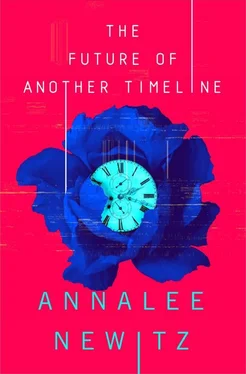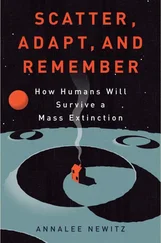“What about your plan to sabotage the Machines?”
A whistling breath came from Elliot’s throat. His eyes wandered, unfocused. This time when he spoke, I wasn’t sure Morehshin had told the truth about not hurting him.
“Soon we will have full control of the Machines, and restore the moral order.” His face turned gray as green pinpricks throbbed below his skin. “You will no longer be able to repress our true history.”
“How are you going to control the Machines?”
Elliot wheezed. “The sword… in the stone. You… you…” He looked at me with those perfect eyes. “You will never understand. It is the destiny of men.” His tongue started to loll, like a man being strangled.
Soph rushed to his side, feeling for his pulse. “Stop now! Can you not see he is dying!”
“Fine.” Morehshin made a dismissive gesture with the multi-tool. “You can sleep now.” A bit of glimmering dust swirled out of Elliot’s ears and he snored, ruddiness returning to his face. With a few more sweeps of her multi-tool, Morehshin restored his clothes to their original state. She didn’t bother to look up at us until she’d put his shoe back on. Then she registered the horror on Soph’s face and shrugged. “What? He won’t remember anything.”
“What the hell is that… thing?” I’d never seen Aseel search for words.
“It’s my multi-tool. You called it a sewing kit.”
“Did you torture him?” I was sweaty with anxiety, and something worse. Memories from my past that I wanted to forget.
“No. I made him tell the truth.”
“What—like Wonder Woman?” Embarrassed, I realized I’d made a reference to the future.
Morehshin cocked her head at me. “Not like Wonder Woman. Like a queen.”
“But I thought you said the queens have no power.”
“Hearing the truth isn’t power. Doing something about it… that’s different. That’s where the Daughters of Harriet come in. Now help me get this sack of potatoes out on the street.”
We wrapped Elliot in an old blanket and dragged him downstairs, snoring loudly, then deposited him unceremoniously next to the gutter.
Morehshin surveyed our work. “He’ll have a headache when he wakes up, plus short-term amnesia.”
Soph spilled gin on him, then planted an empty bottle next to his slumped form. “That completes the picture, doesn’t it?”
Back in Soph’s chambers, none of us felt like drinking except Morehshin, who tossed back another shot and rubbed her hands together. “We know when Comstock is coming to the village, so let’s invite all our sisters to join him.”
I was still stuck on what Elliot had said about the Machine sabotage. “What do you think he meant by ‘the sword in the stone’?”
Morehshin shrugged. “He used wordplay to tell the truth without revealing anything. We can’t afford to worry about that now—we’re in real time. The Machines are stronger than men know. Let us turn to the abolition of Comstock. How can we reach all the women?”
I frowned, but she was right. We had only five days to plan. “This is going to be a major outreach effort. It’s not like we can contact women psychically like one of those scammer Spiritualists.”
“Oh.” Morehshin sounded abashed. “Right. No neuro-magnetics in this haplotype.”
It was another one of those bad translations, or maybe a perfect translation of a concept for which we had no equivalent. Aseel gave Morehshin a dubious look. “I suppose we don’t. Soph, you must have a pretty big mailing list from your newsletter subscribers.”
She nodded. “I can send out cards that say the angels are gathering at the Algerian Village on Wednesday night. I bet a lot of them will be curious enough to come. Plus we can hand out copies of my article on the danse du ventre at the show!”
“Oh, did it finally come out in print?” I grinned, remembering how she told me about it on the day we first met.
Soph nodded, flushing with pleasure as she showed us copies of New York World with her byline.
Aseel grinned too. “That’s a good idea. I can take invitations around to women at the other villages on the Midway. All we need are about fifty women to make a crowd.”
I thought about Lucy Parsons and her fiery speech. Maybe she wasn’t willing to speak up about race and gender, but she was still our ally. “I’ll make a few signs and put them up at the union meeting halls,” I said. “Plus, I can flyer women’s dormitories at the university.”
Morehshin filled in as show seamstress the next day while I posted leaflets at the University of Chicago campus. When it opened a couple of years ago, the regents of the school had taken the radical position that education should be coed. Today there were a lot of young women in bicycle outfits and split skirts wandering around, though school was out for the summer. I couldn’t help but smile at one who had a thick geology textbook in the straw basket attached to her handlebars. Still, it was a bittersweet feeling. This was the first generation of college-educated women in America. Our place in this nation was so fragile; it was still far too easy to edit us out.
* * *
Wednesday night was humid. Sunset spread like a rash over the water, and the reek of rotting pig guts in the river mingled with smoke from roasting nuts. When I arrived for pre-show prep, there was already a line forming outside the theater entrance. By the time we opened the doors, the crowd was twice its usual size and packed with people who were not men. They kept streaming in, filling the seats, taking Soph’s pamphlet about the spiritual meaning of the dances. There were performers from the Midway, some still in their stage costumes. There were Spiritualists looking high goth, and New Women from the university, wearing athletic outfits and smoking cigarettes. There was even a gang of young, Lucy Parsons–style anarchists looking fierce with their union sashes. I could see people with dark brown skin and pale pink skin and every shade in between; among them were immigrants and travelers. We made a spectacle of ourselves and enjoyed it.
When there were at least a hundred people crowding the theater, laughing or smirking, men in the audience started to look around them with discomfort. Why were there so many ladies in the room? They thought the point of this show was to stare at women, not to stare with them.
At last Comstock appeared, unfashionable muttonchops framing his round face like storm clouds. Trailing behind him were three of the wealthiest Lady Managers, famous society wives of hoteliers and industrialists. One of them had brought doilies to spread on the wooden seats where each would be placing her petticoat-muffled bum. A group of burly, cigar-chomping people in the front row ceded their seats to the ladies, and Comstock glared until a gray-haired suffragette, decked out in her lacy whites from the ’60s, offered him the seat alongside them. Soph surrendered her chair to the suffragette, and smiled sweetly at the Lady Managers as she gave them copies of her pamphlet. The four observed twenty minutes of dances with what appeared to be polite attention. None of them made faces or fainted. I watched closely, hypervigilant; we needed to keep track of their position if our plan was going to work.
By the time Aseel came out on stage, the men had forgotten their self-consciousness and stomped along with us. “LA-DY AS-EN-ATH!” We chanted her name, clapping for each syllable. As Aseel captivated the room with her movements, the whole audience—men, women, everyone else—hailed her with coins. Comstock and the Lady Managers collected themselves, stone-faced, and attempted to find the exit through the rowdy crowd.
Soph and I stood in the back, discreetly motioning for our friends to follow. The plan was to waylay our special visitors as they paraded out past the ticket booths. But then Sol erupted from the theater office unexpectedly, making a beeline for Comstock. Of course he was here. He knew the moralist’s reputation, but was always hopeful that showbiz professionalism could win the day.
Читать дальше








![Аннали Ньюиц - Автономность [litres]](/books/424681/annali-nyuic-avtonomnost-litres-thumb.webp)



